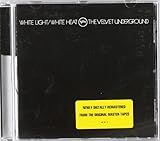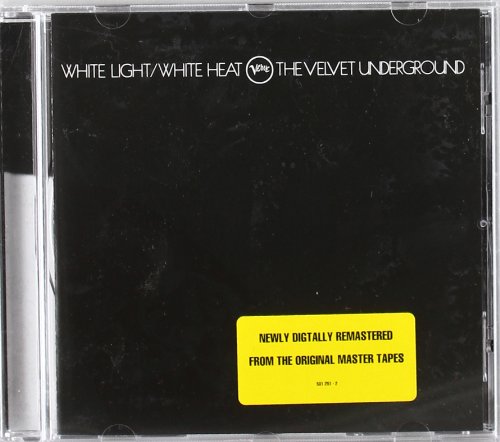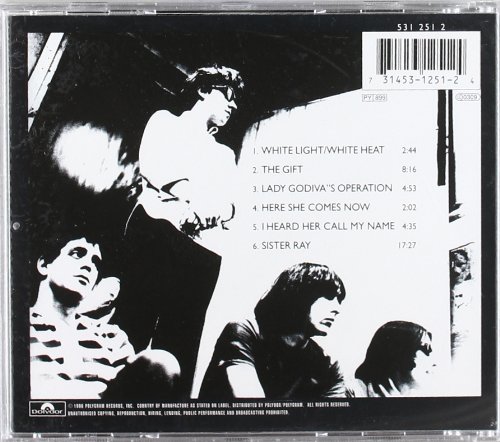Disco de The Velvet Underground: «White Light/White Heat»

- Valoración de usuarios: (4.3 de 5)
- Título:White Light/White Heat
- Fecha de publicación:1996-05-07
- Tipo:Audio CD
- Sello discográfico:Polydor / Umgd
- UPC:731453125124
- 1 White Light/White Heatimg 2:48
- 2 The Giftimg 8:20
- 3 Lady Godiva's Operationimg 4:57
- 4 Here She Comes Nowimg 2:06
- 5 I Heard Her Call My Nameimg 4:39
- 6 Sister Rayimg 17:31
Having been a precocious kid I had the distinct pleasure (yes, I said pleasure) of seeing this band at the original Tea Party in the South End of Boston shortly after the release of "White Light/White Heat". Moe Tucker was still playing her drums standing like a mad majorette. Cale's electric voila was so loud plaster dust fell from the ceiling, literally.
With all the peace and love nonsense cluttering what little media was free enough to experiment this album cut like a knife through to the truth of what city life was really about.
When my sons asked me if I was a hippie I gave them the first MC5 and Stooges' albums - and "White Light/White Heat". They now play in a Punk band. I'm glad they got the point...
Once you tame this wild, noisy, amphetamine-fueled, out-of-control beast of an album, it will be your best friend for a lifetime. Few albums are as off-putting on initial hearing; fewer still will reward you more after hundreds of spins. Inexplicably, its chaos, noise, and howling confusion will become comforting. But it takes awhile...
For example, I doubt anyone ever thought they'd play side two (for those who remember vinyl) a second time after weathering the "I Heard Her Call My Name"/"Sister Ray" barrage...but if you can brave Lou Reed's paint-stripping lead guitar and John Cale's shrieking organ a second and then third time, slowly the initial repulsion will turn to compulsion. And the mysteries will unfold...20 or 30 years later, you'll still be trying to figure out "Lady Godiva's Operation" or "Sister Ray"...or at least basking in their glorious noise.
Songwise, it's not the best music the Velvets, Reed, or Cale ever made, but it's probably the most influential--would Sonic Youth, Yo La Tengo, Jesus & Mary Chain, Pavement, My Bloody Valentine, the lo-fi movement, etc., ever have happened without it?
"White Light/White Heat" is the sound of smart, cool, frustrated, and heavily amped (in all senses of the word) people coming apart and making as loud a noise as possible while they still could. And it's timeless because to this day it still irritates and scares people even after we've all been numbed by decades of hardcore, shock rock, and death metal.
Finally--the louder you play it, the clearer it gets. Volume is the key to this swamp creature of an album emerging from the murk...and the creature wants to be your friend despite its initially scary face.
White Light/White Heat is one of the great, ugly nihilistic trash heaps functioning as a rock and roll record, rivaling the Stooges' albums in maliciousness and, in the terrifying second half, surpassing them in cacophony. The air conditioning in my car has gone out recently, and so I've been forced to drive around with the windows lowered. I've been blasting this album at full volume out of my open windows for the past two weeks and passer-bys generally tend to look a bit put-upon.
The Velvet Underground had already infused an unprecedented social realism in their lyrics and experimented with drones and abrasive textures on their first album, but on White Light/White Heat they pushed these innovations to the extreme. The lyrics evolved from the gritty to the outrageous, and the band created a self-consciously alienating (but occasionally hypnotic and beautiful) racket.
The album is comprised of a meager six tracks, the last of which, the infamous "Sister Ray," is a monstrous 17 minute long jam, taking up most of Side B, and seemingly designed to weed out the faint of heart. However, its shortness on actual songs merely gives the album a more concentrated impact.
The Velvet Underground usually painted a relatively ambivalent picture of drug-use, at least compared to some of their west-coast contemporaries such as the Grateful Dead. In "Heroin" and "I'm Waiting For the Man," both from their first album, the narrator pays at least somewhat of a price for his highs. The exception to this rule is the album-leading title track, a virtual commercial jingle for amphetamines so unqualified and enthusiastic it's almost as shocking as the much more abrasive material that follows. A simple rock and roll ditty, it features a call and response chorus with Lou Reed enthusing about his drug of choice echoed by the band shouting the title of the song.
Next comes "The Gift," a Reed-penned short story read by John Cale over a gritty, slithery instrumental. It's a mostly successful experiment, despite its length.
"Lady Godiva's Operation" is, upon first listening, one of the scariest tracks on the album, but further listens reveal it as a darkly beautiful song, even when it begins describing what sounds like a surgical operation gone wrong. Slinking along on a weird John Cale bass line, it has a sultry and menacing power.
"Here She Comes Now" is the lone 'pop' song on the album. Despite its balladic qualities, it's still a little unsettling due to its spectral guitars and vaguely unnerving lyrics. ("If she ever comes now, now" Physically? Sexually? "It looks so good/she's made out of wood"? I'm a bit afraid to go there.)
None of the preceding tracks can quite prepare the listener for "I Heard Her Call My Name." A driving rock song with lyrics hinting at necrophilia, it's set apart by Lou Reed's psychotic guitar-mangling. It sounds like the aural equivalent of a barbed-wire factory exploding, creating some sort of precedent for the Jesus and Mary Chain.
The most famous track on the album is probably the crushing final jam, "Sister Ray". The song is built around a brutal, simple, and memorable riff and features repeated lyrics about murder, transvestitism and drugs. ("I'm just searching for my mainline/I couldn't hit it sideways.") The first six minutes feature the band at their most violently riveting and effective. Cale foreswears the bass for the organ. The tone of the instrument is so loud and abrasive that at times it almost buries the rest of the band, and his seemingly classically influenced and thunderous soloing is one of the most exciting parts of the track. The band slowly descends into chaos and regroups into a hypnotic drone, Reed and Morrison's guitars slashing wildly, Cale's keyboard meandering around the scale and sometimes punctuating the song with atonal bursts of organ noise. Reportedly the sound engineer only made it through part of the recording before excusing himself.
The length of this track is somewhat effective in the context as an album closer, but it is also one of the few things keeping the album from being perfect; if you're not completely on the band's wavelength at this point, it can seem to go on awhile.
John Cale would leave due to comepeting egos shortly after this album, taking with him much of the band's experimental edge. The band didn't really suffer for it, they were too good for that. However, they (or almost anyone else) would never record an album this cathartic, visceral or bloody-minded again.
I Have Been a fan of the Velvet Underground ever since I've heard their debut album,"The Velvet Underground & Nico", but nothing could prepare me for this. White Light/White Heat is without a doubt one of,"if not", the most loudest and out of control record ever produced. As Soon as you here the opening title track you know the group has left the halfway secured environment of the debut album and have entered the world of abrasive proto-punk and raunchy experimental rock. The second track is like an evil explicit version of a Bob Dylan folk song, telling the dark story of a man who ships himself to his exlover in a cardboard box. I don't want to spoil the demented ending to that song. The next two tracks actually have somewhat of a melody. There're two of the shorter tracks on the album but are still very memorable. Then comes side two. Things explode with the track,"I Heard Her Call My Name", with it's audible assualt and featuring some of Lou Reed's best guitar playing. Then comes one of the biggest climaxes in rock history," Sister Ray". I've heard songs such as The Doors,"The End", and Pink Floyd's,"Interstellar Overdrive", and I thought those were crazy and out of control but this tops them all. The song tells a story of drugs, explicit sex images and images of crime and murder in a epic seventeen minute jam featuring some of the most unbelievable and insane guitar and organ work ever featured on a record. To dimiss this as just noise is a usual and understandable conception. This album is not for everybody. You need to be prepared for the assualt not just on your ears but on your whole idea of music. If your looking for something new and thrilling, track down this record and buy it. You will be treated to some of the most incredible sounds in the history of music.
Writing for Rolling Stone about The Velvet Underground, Julian Casablancas, the ineloquent lead singer of The Strokes called White Light/ White Heat a "real f***-the-world album." I don't know if I could possibly disagree with him more. White Light/ White Heat is one of the most experimental mainstream releases ever, it's brazenly atonal, and in its attempt, is subversively entertaining and influential. What it's not is angry, not in the traditional sense. Instead, it's a knowing, even joyful mockery of bourgeoisie morality - a morality that includes certain tropes of musicianship. So the title song that opens the record feels the "white light goin', messin' up my mind," and the result is a sort of ingestion and through-the-looking-glass capitulation of what culture really is. The centerpiece, strangely, is "The Gift," an 8 minute spoken tale of a bland, spoiled couple (Waldo! And Marsha!) that turns into a tail of accidental murder - a track that's so transfixing and barbed, it's hard to figure out whether it's a triumph of music or storytelling. The rest of the record is the epitome of the Velvets prickly difficulty, like the tune of "Lady Godiva's Operation" overtaken by outside voices, or the 17-minute opus "Sister Ray" - they're testaments to the brave specificity of the bands noisy compositions, presenting a countercultural assault on the coming faux-peppiness of the early 70's. Doing so wasn't f***ing the world at all, it was saving it, with a toothsome grin.


